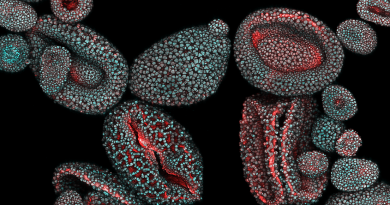Control of genesis of new neurons in the adult hippocampus by GABAergic interneurons impaired by dysfunctional amyloid precursor protein
By Ruth SoRelle, M.P.H.

Amyloid precursor protein (APP) modulates the many processes through which newborn neurons are generated in the adult brain, said researchers from Baylor College of Medicine in a report that appears in the Journal of Neuroscience.
An important component of the proper formation of these neurons are the GABAergic interneurons, which maintain a state of homeostasis between excitation and inhibition. Formation of new neurons or neurogenesis in adults decreases with age.
New neurons
“When new neurons are generated from neural stem cells, they are first produced as precursor cells and then differentiate into neurons and other types of brain cells,” said Dr. Hui Zheng, corresponding author of the report and director of the Huffington Center on Aging at Baylor. “After the cells differentiate, they need to incorporate into the brain and existing networks of brain cells.
Without functioning APP, the neurons do not form the proper morphology and cannot integrate into the existing networks. They die after they are generated.”
Knock-out mouse
To study the issue, she and her colleagues used a special mouse that allowed them to “knock out” APP in different kinds of neurons.
“There were three possibilities,” she said. “APP could be expressed within the new neurons or within the excitatory neurons or within inhibitory neurons.
When they inhibited APP in the three populations of neurons, they found that GABAergic interneurons modulate the neurogenesis or production of new neurons.
“Inhibitory neurons play as important a role as excitatory neurons,” she said, although the latter are far more numerous.
Age critical factor
“This helps us understand why age is such a critical factor when we talk about Alzheimer’s disease,” she said.
Others who took part in this work include Baiping Wang, Zilai Wang, Lu Sun, Li Yang, Hongmei Li, Allysa L. Cole, Jennifer Rodriguez-Rivera and Hui-Chen Lu, all of Baylor. Lu is also with the Mary and Gordon Cain Pediatric Neurology Laboratories at Baylor and the Jan and Dan Duncan Neurological Research Institute at Texas Children’s Hospital.
Funding for this work came from the National Institutes of Health [Grants AG032051, AG033467, and AG020670 (to H.Z.) and NS048884 (to H.C.L.)], the Baylor College of Medicine Intellectual and Developmental Disabilities Administrative and Mouse Neurobehavioral Cores Grant (HD024064).



